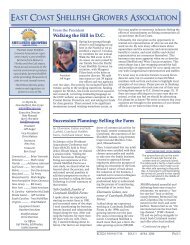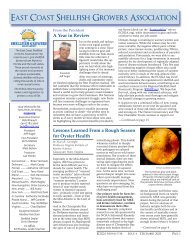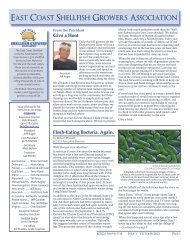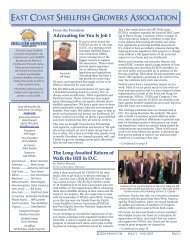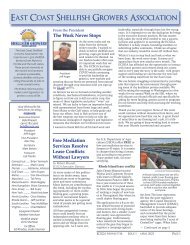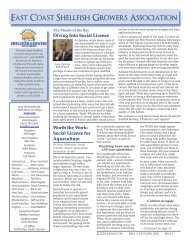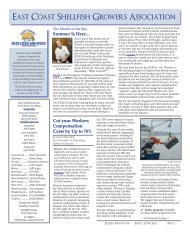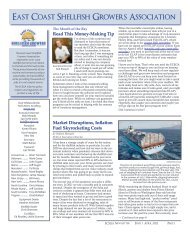ECSGA newsletter December 2022
Articles include: Why the ISSC conference is vital to your business; More on bird interactions with floating shellfish gear; What does the market for shellfish look like in the EU? Stay out of trouble with the IRS by following these tips; Mass oyster mortalities in North Carolina still a mystery; Some new reseach on microplastics in oysters and mussels; Oyster larvae respond to underwater sound! Hurricane Fiona causes millions in losses in Prince Edward Island, Canada; A full preview of all the upcoming shellfish aquaculture conferences this winter; Why do special interest groups have more clout than science? and NOAA's 5-year plan for aquaculture development.
Articles include: Why the ISSC conference is vital to your business;
More on bird interactions with floating shellfish gear;
What does the market for shellfish look like in the EU?
Stay out of trouble with the IRS by following these tips;
Mass oyster mortalities in North Carolina still a mystery;
Some new reseach on microplastics in oysters and mussels;
Oyster larvae respond to underwater sound!
Hurricane Fiona causes millions in losses in Prince Edward Island, Canada;
A full preview of all the upcoming shellfish aquaculture conferences this winter;
Why do special interest groups have more clout than science? and
NOAA's 5-year plan for aquaculture development.
Create successful ePaper yourself
Turn your PDF publications into a flip-book with our unique Google optimized e-Paper software.
P.E.I. Growers Hammered<br />
by Hurricane Fiona<br />
by Robert Rheault,<br />
<strong>ECSGA</strong> Executive Director<br />
Despite projections for a very active hurricane<br />
season in <strong>2022</strong>, the East Coast aquaculture<br />
community seems to have dodged a<br />
bullet for once. We did suffer the anxiety of<br />
a few near misses, but somehow managed to<br />
escape the devastation that shellfish farming<br />
communities saw in recent years when<br />
storms ravaged the Mid-Atlantic and Gulf<br />
Coasts.<br />
In late September, growers in Cedar Key<br />
and the northwest coast of Florida were<br />
spared the brunt of Hurricane Ian’s ferocity<br />
when the storm turned east into Fort Myers,<br />
plowed across the state and headed out<br />
into the Atlantic before turning west again.<br />
Ian finished up by drenching South Carolina<br />
growers and dumping a ton of rain on North<br />
Carolina and Virginia farms.<br />
Mid-September brought Hurricane Fiona,<br />
which hammered Puerto Rico and then went<br />
out to sea and up the East Coast, bringing us<br />
high surf and rain but little else. However,<br />
Fiona wreaked devastation on Prince Edward<br />
Island, Canada. I had always thought<br />
that hurricanes north of Maine were nothing<br />
to fear, and it’s true that by the time they<br />
reach cooler northern waters, their energy<br />
wanes. But Atlantic Canada suffered a lot<br />
of damage from post-tropical Fiona’s storm<br />
surge, which results from the combined effects<br />
of extremely low atmospheric pressure<br />
raising sea levels (potentially by<br />
more than a foot and a half) and<br />
wind-whipped waves.<br />
According to “The Globe and<br />
Mail,” Fiona’s storm surge broke<br />
water level records at four tidal<br />
gauges across Atlantic Canada,<br />
literally breaking at least two of<br />
them. Steen Gunderson of Bouctouche<br />
Bay Industries in New<br />
Brunswick, Canada, reported<br />
that growers using floating bags<br />
were hurt more than growers using<br />
his OysterGro ® cages, which<br />
appeared to ride out the storm<br />
better when properly anchored.<br />
An article in “Northern Aquaculture”<br />
indicated that mussel and<br />
oyster farmers in P.E.I. suffered<br />
$28 million in damage. Shellfish<br />
growers there are hoping for<br />
some government disaster relief,<br />
but they don’t have an established<br />
disaster relief program for aquaculture<br />
in Canada like we do.<br />
American growers should consider<br />
themselves lucky to have<br />
access to free crop-disaster assistance<br />
through the Farm Service<br />
Agency’s Emergency Livestock<br />
Assistance Program (ELAP).<br />
NEW!<br />
SALTWIRE.COM<br />
The storm surge from Hurricane Fiona tossed<br />
oyster trays onto the shore on property owned by<br />
Raspberry Point Oysters in New London, Prince<br />
Edward Island, Canada.<br />
Iso 1800 <br />
REFRIGERATED<br />
MICROALGAE FOR<br />
SHELLFISH<br />
TP1800 <br />
Shellfish<br />
Diet<br />
1800 <br />
An article in SALTWIRE put Fiona’s<br />
damage estimate closer to $75 million,<br />
with many mussel and oyster farmers still<br />
struggling to get damaged gear out of the<br />
water before winter ice sets in. SALTWIRE<br />
reported that not every farmer was impacted,<br />
and shipments of oysters and mussels continue,<br />
but the impacts of the storm could slow<br />
harvests for years. Mussel farmers apparently<br />
lost most of the spat collected this summer.<br />
According to data from Statistics Canada,<br />
in 2021 P.E.I. exported $22.5 million worth<br />
of oysters and $38.8 million of mussels.<br />
Up until September <strong>2022</strong>, the industry had<br />
exported $27.7 million in oysters, and $28.4<br />
million in mussels. Since the lion’s share of<br />
these exports head right over the border to<br />
New England, it looks as if we can expect a<br />
hiccup in Canadian production for at least a<br />
few years to come.<br />
TW 1800 <br />
ReedMariculture.com/complete<br />
© <strong>2022</strong>-2023 Reed Mariculture, Inc. All rights reserved. Instant Algae, Iso 1800, LPB frozen Shellfish Diet, Pav 1800, Shellfish Diet, Tet 3600, Tp 1800, Tp 3000, Tw 1800, Tw 2400, & Ensuring Hatchery Success are trademarks or registered trademarks of Reed Mariculture Inc.<br />
Pav 1800 <br />
<strong>ECSGA</strong> Newsletter Issue 4 december <strong>2022</strong> Page 13




